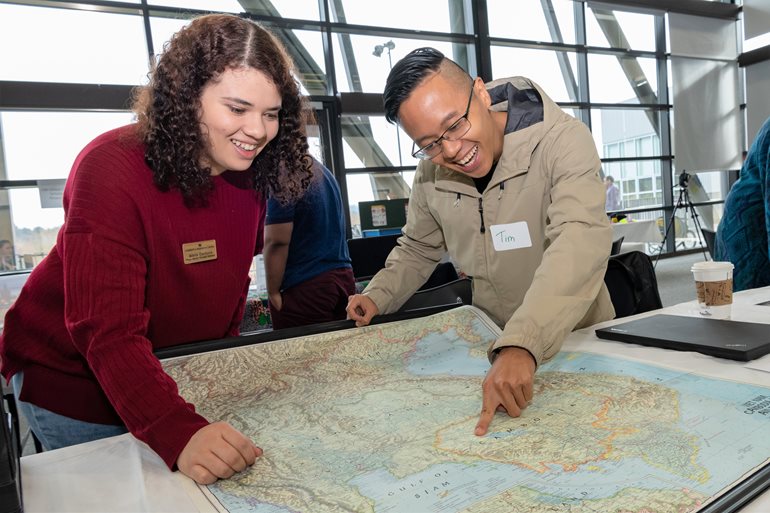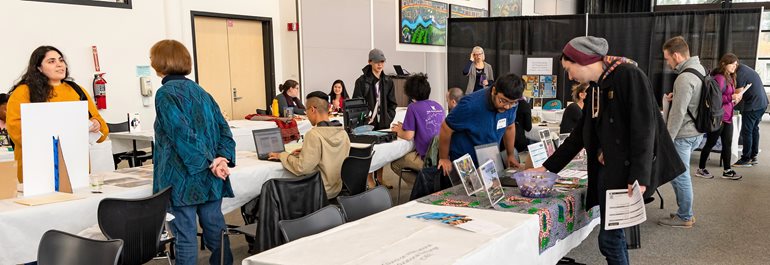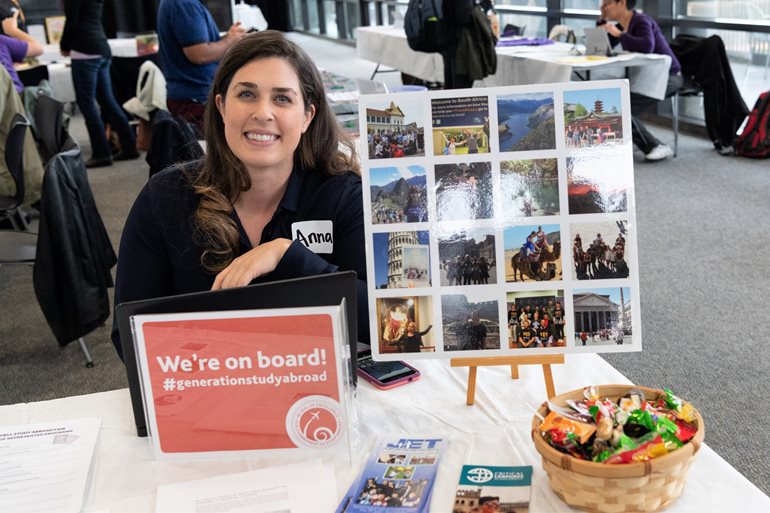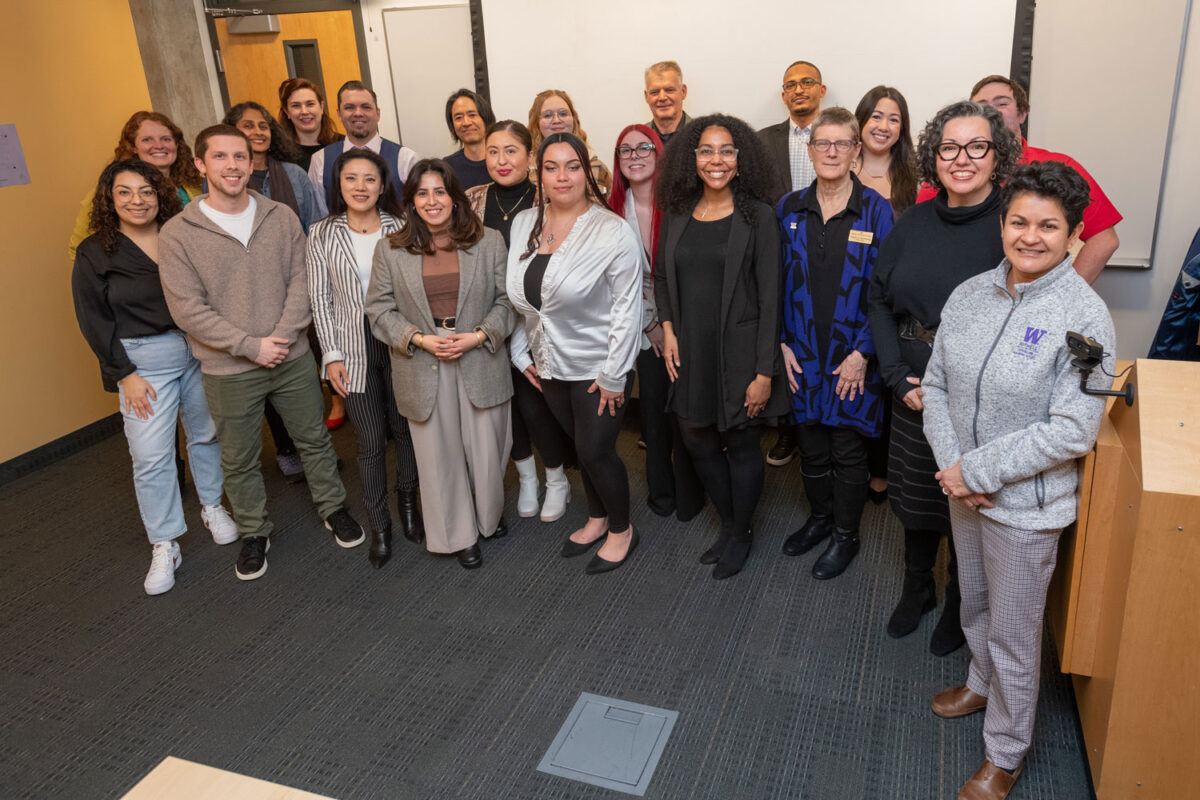
By Douglas Esser
A study abroad trip to Cambodia and Thailand has changed the way some business students at the University of Washington Bothell are thinking about their futures.
Alicia Garduno had been considering a career as an actuary once she graduates in June with a degree in Mathematics. Open to other possibilities, she took the course, Corporate Social Responsibility in Thailand and Cambodia.
After seeing in person how corporations, social enterprises and nongovernmental organizations operate, Garduno has a new perspective on her career path.
Broader career possibilities
“This has given me a direction to go in,” Garduno said. “I never really thought I could step into the business world this much as a math major.”
Now, she wants to pursue an MBA, with the idea of bringing skills in statistics and data analysis to NGOs. “Good intentions are not always enough. Having a business perspective would help them be more effective,” Garduno said. “If I could help with that, that would be amazing.”
For his part, Tim Law is looking to start a marketing career after graduating at the end of autumn quarter with a degree in Business and a concentration in marketing. On the early fall study abroad trip, he saw how businesses large and small are thinking about serving the broader scope of all stakeholders, instead of only shareholders.
“We learned directly from the experts what they were doing for their companies and their cities,” Law said. “A lot of things I was hearing here at Bothell were reinforced through the trip.”
One stop was Apopo, an NGO that uses trained rats to sniff out old landmines. The rats scratch the dirt when they smell the explosive, which a bomb-disposal expert then destroys. That made an impression on Law and not only because they were “pretty big rats, I’ve got to say.”
Now, he’d like to return to Asia and contribute his marketing skills to a socially minded startup or NGO, possibly even at Apopo, Law said.
Inaugural Study Abroad Fair

Law and Garduno talked about their experiences at the first UW Bothell Study Abroad Fair on Nov. 12 in the North Creek Events Center. Their trip was one of about a dozen that are led each year by UW Bothell faculty.
“I want to have our student body challenge themselves and embark on these types of things,” Law said. “People really should take advantage of it.”
Between 150 and 200 UW Bothell students study abroad every academic year. Students can find more information through the Global Initiatives Office at the Student Success Center (UW1-160).
The new fair, requested by students, was organized by Jacqueline Nguyen, a study abroad peer adviser. She emphasizes opportunities for all majors, not just those in the social sciences. “We’re really trying to encourage business and STEM students to have that experience beyond the classroom,” she said.
Nguyen is a senior majoring in Business herself. In the spring of 2019, she traveled with a UW group to the Czech Republic to study human rights in central Europe. Coming from a family of Vietnamese immigrants, she was surprised to see a Vietnamese business community in Prague. It started when communist Czechoslovakia brought in cheap labor from Vietnam. “To see that in Europe was amazing to me,” she said.
Nguyen and Garduno are also both part of the 2019 cohort of the Global Scholars Program, an initiative of the School of Interdisciplinary Arts & Sciences that considers different cultural perspectives in the larger global community.
Global issues and experiences
James Reinnoldt, an adjunct professor of global business in the School of Business, led the study abroad trip to Thailand and Cambodia. He took 10 students through four cities in three weeks, Aug. 24 – Sept. 12.
It was the 10th UW trip overall that Reinnoldt has led, and he’ll lead the Thailand-Cambodia course again for early fall of 2020. The study abroad tour is a confluence of interests for Reinnoldt who spends some time in Thailand each year working as an airline consultant and directing charity work.
Reinnoldt said corporate social responsibility is a great topic because it starts with an understanding of issues such as environmental stress, human trafficking, undocumented migrant workers and urban poverty.
“It’s a good course in that it allows us to talk about the world as it is and then the role and place of business in terms of how they can have a positive impact,” he said. “Students get a sense of the things that are shaping the world both on the good side and bad side.”
For example, an undocumented Burmese worker told the students how he thought he was going to Thailand to work in agriculture. “Before he knew it,” Reinnoldt said, “he was traded like a slave and put on a ship for 11 years and never came ashore.
“You can read about human trafficking or talk about it in class, but this trip gives my students a very real world, personal perspective on what is trafficking and how might the problem be solved,” Reinnoldt said.
Another man in Cambodia told the group how his family members were among the millions killed by the Khmer Rouge.
What is my place in the world?
Students spent one morning helping plant a village garden to understand what the rural poor in Cambodia face, Reinnoldt said. “They got their hands dirty.”
They learned corporate responsibility strategies through visits to companies such as Microsoft, King Power and AIS Telecommunications. They heard from academics and journalists.
After their real-world insights, Reinnoldt asked students to think how they could make an impact: “As ethical business people with a global view, what is my place in the world, and how can I effect change in a positive way?”
Students find this study abroad trip challenging because of the pace of travel, the stress of different cultures and the academic obligations of papers and presentations, Reinnoldt said. Yet, it all adds up to a life-changing experience for many students.
“A lot have a better idea of what they want to do in a career, the sort of company they want to work for, issues they want to be involved with,” he said. “How can a company develop a strategy that takes a positive place in the world in a manner that’s profitable?”
Whole-body learning

Research shows that study abroad students are more successful, said Natalia Dyba, director of Global Initiatives. That may be because they take more ownership of their learning, she said.
“They’re learning with their whole bodies — often their first time away from home, learning independence, practicing communication in a different cultural context and dealing with unexpected challenges,” Dyba said. “The multisensory, whole-body learning is what makes study abroad so powerful and very memorable for students.”
Those skills also land jobs.
“Employers are looking for recent graduates who have cross-cultural communication skills, who have a strategic international understanding of their field, who can work in diverse teams — all things that can be developed in a study abroad program,” Dyba said.



